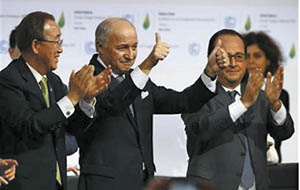
Global climate agreement “offers the best chance we have to save the one planet we have,” says U.S. president, who now faces Republican opposition • Deal commits both rich and poor nations to reining in rising emissions blamed for warming the planet.
The global climate summit in Paris forged a landmark agreement on Saturday, setting the course for a historic transformation of the world’s fossil fuel-driven economy within decades in a bid to arrest global warming.
After four years of fraught U.N. talks often pitting the interests of rich nations against poor, and imperiled island states against rising economic powerhouses, French Foreign Minister Laurent Fabius declared the pact adopted, to the standing applause and whistles of delegates from almost 200 nations.
“With a small hammer you can achieve great things,” Fabius said as he gaveled the agreement, capping two weeks of tense negotiations at the summit on the outskirts of the French capital.
U.S. President Barack Obama on Saturday night said the new global climate agreement “offers the best chance we have to save the one planet we have” and credited his administration as being a driving force behind the deal.
Obama, speaking from the White House, sought to celebrate what could be a legacy-defining achievement—if the Republican-controlled Congress or the courts don’t block him, or his successors in the White House don’t reverse him.
“I believe this moment can be a turning point for the world,” Obama said. “We’ve shown that the world has both the will and the ability to take on this challenge.”
The final agreement was essentially unchanged from a draft unveiled earlier in the day, including a more ambitious objective of restraining the rise in temperatures to “well below” 2 degrees Celsius (3.6 degrees Fahrenheit) above pre-industrial levels, a mark scientists fear could be a tipping point for the climate. Until now the line was drawn at only 2 degrees.
Hailed as the first truly global climate deal, committing both rich and poor nations to reining in rising emissions blamed for warming the planet, it sets out a sweeping, long-term goal of eliminating net man-made greenhouse gas output this century.
Obama said the world leaders meeting in Paris “met the moment” and that people can be more confident “the planet will be in better shape for the next generation.”
The president took credit for the successful negotiations. “Today, the American people can be proud—because this historic agreement is a tribute to American leadership. Over the past seven years, we’ve transformed the United States into the global leader in fighting climate change.”
Obama said the agreement is not perfect, but sets a framework that will contain periodic reviews and assessments to ensure that countries meet their commitments to curb carbon emissions. As technology advances, targets can be updated over time. The agreement also calls for supporting the most vulnerable nations as they pursue cleaner economic growth.
Top Republicans in Congress dismissed the pact as nothing more than a long-term planning document and said Obama was making promises he won’t be able to keep. They say his commitment to reduce emissions from U.S. power plants would cost thousands of American jobs and raise electricity costs.
Senate Majority Leader Mitch McConnell said Obama is “writing checks he can’t cash and stepping over the middle class to take credit for an ‘agreement’ that is subject to being shredded in 13 months.”
And Republican Sen. James Inhofe said Americans can expect the administration to cite the agreement as an excuse for establishing emission targets for every sector of the U.S. economy.
Secretary of State John Kerry said from Paris: “I have news for Senator Inhofe. The United States of America has already reduced its emissions more than any other country in the world.”
Several Democratic lawmakers applauded Obama’s efforts.
Sen. Harry Reid, the Senate minority leader, said climate change poses one of the greatest threats the world has ever known and that no country acting alone can stem the tide.
“The time to act is now,” he said.
From the outset, some criticized the deal for setting too low a bar for success. Scientists warned that the envisaged national emissions cuts will not be enough to keep warming to less than 2 degrees Celsius.
Unlike the Kyoto Protocol, the last major climate deal reached in 1997, the Paris pact will also not be a fully legally binding treaty, something that would almost certainly fail to pass the U.S. Congress.
Meanwhile, the deal also requires rich nations to maintain a $100 billion-a-year funding pledge beyond 2020, and use that figure as a “floor” for further support agreed by 2025, providing greater financial security to developing nations as they wean themselves away from coal-fired power.
By Israel Hayom Staff








